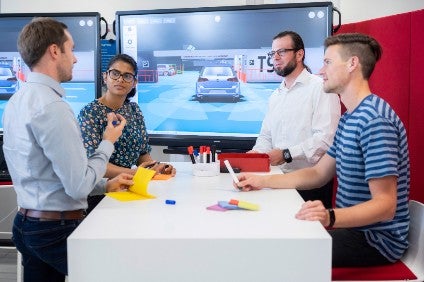
Volkswagen said it would use virtual validation to put driver assistance systems into production faster.
The assistance systems of the next generation will then learn from virtually generated driving and traffic situations making development processes faster and more efficient.

Discover B2B Marketing That Performs
Combine business intelligence and editorial excellence to reach engaged professionals across 36 leading media platforms.
In the long term, it is conceivable millions of test kilometres required for validating automated driving could be completed in virtual environments.
The automaker is already testing software developed in-house to simulate such driving in traffic situations and its first application is teaching assistance systems for the I.D. model family.
Systems learn faster and hardware tests are reduced
Assistance systems can be 'trained' continuously in any scenario desired; this approach dramatically accelerates the learning speed of the systems concerned.
With virtual validation, the automaker also expects to be able to develop a rapidly growing number of systems and networked vehicle functions to production. To date, assistance systems have been tested using a hardware-based approach by connecting components to test rigs via data interfaces. As the number of networked functions grows, this means more and more hardware-based tests are necessary. Virtual validation will reduce the volume required, as physical test rigs will no longer be essential.
High-performance software is essential for the simulation of complex environments. This software (SimFAS) is being developed by group IT and technical development working together. In the long term, they want to be able to generate any virtual traffic and driving situation.
A new assistance system will then be connected to these virtual scenarios.
Sensors will process the virtual ambient data in the same way as actual ambient conditions. The software will also visualize the virtual scenario via a 3D graphic environment. The engineers will then be able to observe the behavior of assistance systems precisely and to intervene and optimise the systems.
Engineers also want to link this simulation platform to the group IT cloud in order to benefit from its enormous computing capacity. Hundreds of driving situations could then be learned by the same assistance system in parallel. In addition, engineers would be able to build up a virtual library of traffic situations which could be stored as successful learning examples and transferred directly to all new assistance systems.
First application: virtual car park pilot simulates thousands of car parks
The first application simulates thousands of individual car parks with freely definable parameters (architecture, lane guidance, traffic). Car parks are regarded as an ideal example of complex environments which must be mastered by an assistance system.
Long term, millions of test kilometres required for validating automated driving could be completed in virtual environments. The self-learning systems of the vehicle (artificial intelligence) would process data in the same way as data from physical tests on proving grounds and public roads. This would further accelerate the development of production ready automated driving functions.
In addition to virtual validation, the brand is also relocating design and development decisions to the virtual area. By adopting this approach, the brand expects to achieve efficiency savings, to accelerate decision-making processes and to ensure easier cooperation between the teams involved.
Among other approaches, engineers are also working with a virtual vehicle model that allows them to fully experience and interact with the exterior, interior and functions of instruments and multimedia systems as well as modifying them. This virtual model means that the number of costly physical prototypes can be reduced.






